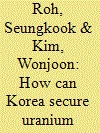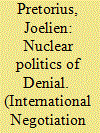| Srl | Item |
| 1 |
ID:
133092


|
|
|
|
|
| Publication |
2014.
|
| Summary/Abstract |
South Korea is heavily dependent on energy resources from other countries and nuclear energy accounts for 31% of Korea's electric power generation as a major energy. However, Korea has many limitations in uranium enrichment and spent fuel reprocessing under the current Korea-U.S. nuclear agreement, although they are economically and politically important to Korea due to a significant problems in nuclear fuel storages. Therefore, in this paper, we first examine those example countries - Japan, Vietnam, and Iran - that have made nuclear agreements with the U.S. or have changed their agreements to allow the enrichment of uranium and the reprocessing of spent fuel. Then, we analyze those countries' nuclear energy policies and review their strategic repositioning in the relationship with the U.S. We find that a strong political stance for peaceful usage of nuclear energy including the legislation of nuclear laws as was the case of Japan. In addition, it is important for Korea to acquire advanced technological capability such as sodium-cooled fast reactor (SFR) because SFR technologies require plutonium to be used as fuel rather than uranium-235. In addition, Korea needs to leverage its position in nuclear agreement between China and the U.S. as was the case of Vietnam.
|
|
|
|
|
|
|
|
|
|
|
|
|
|
|
|
| 2 |
ID:
123691


|
|
|
|
|
| Publication |
2013.
|
| Summary/Abstract |
AbstractSouth Africa was one of the first states to conclude an Additional Protocol with the International Atomic Energy Agency (IAEA) in 2002, allowing the IAEA greater right of access to safeguard nuclear activities and material. In light of this, some observers in the arms control community find it odd that South Africa's representatives at the Nuclear Suppliers Group (NSG) would be the main objectors to making the conclusion of an Additional Protocol a precondition for states wishing to import uranium enrichment and reprocessing technology (classified as sensitive nuclear technology and material). The South African objection should be viewed as only the most recent in a series of objections to measures that may seem obviously in line with nuclear non-proliferation. This emerging pattern in South Africa's nuclear diplomacy and, more specifically, the objection to the Additional Protocol condition are related to its membership in the Non-Aligned Movement (NAM) and can be investigated through the lens of a politics of denial. Denial is the act of saying "no", but it is also in psychological parlance the unconscious thought process manifesting a refusal to acknowledge the existence of certain unpleasant aspects of external reality. It will be argued that South Africa's opposition to the Additional Protocol condition can be explained in the context of two instances of denial: (i) a perceived denial by the nuclear haves of what the Nuclear Non-Proliferation Treaty codifies as an inalienable right to peaceful nuclear technology - something that South Africa is cautious to be complicit in; and (ii) the nuclear weapon states' denial (the psychological meaning) of the unpleasant reality of a hypocritical nuclear order - something that South Africa wants to expose or at least something with which to engage to limit the effects for itself and other NAM members. The politics of denial does not yield to a pragmatist/utopian dichotomy in the nuclear realm, but instead reveals the dialectic nature of realism and idealism in nuclear politics, especially as reflected in South Africa's nuclear diplomacy.
|
|
|
|
|
|
|
|
|
|
|
|
|
|
|
|